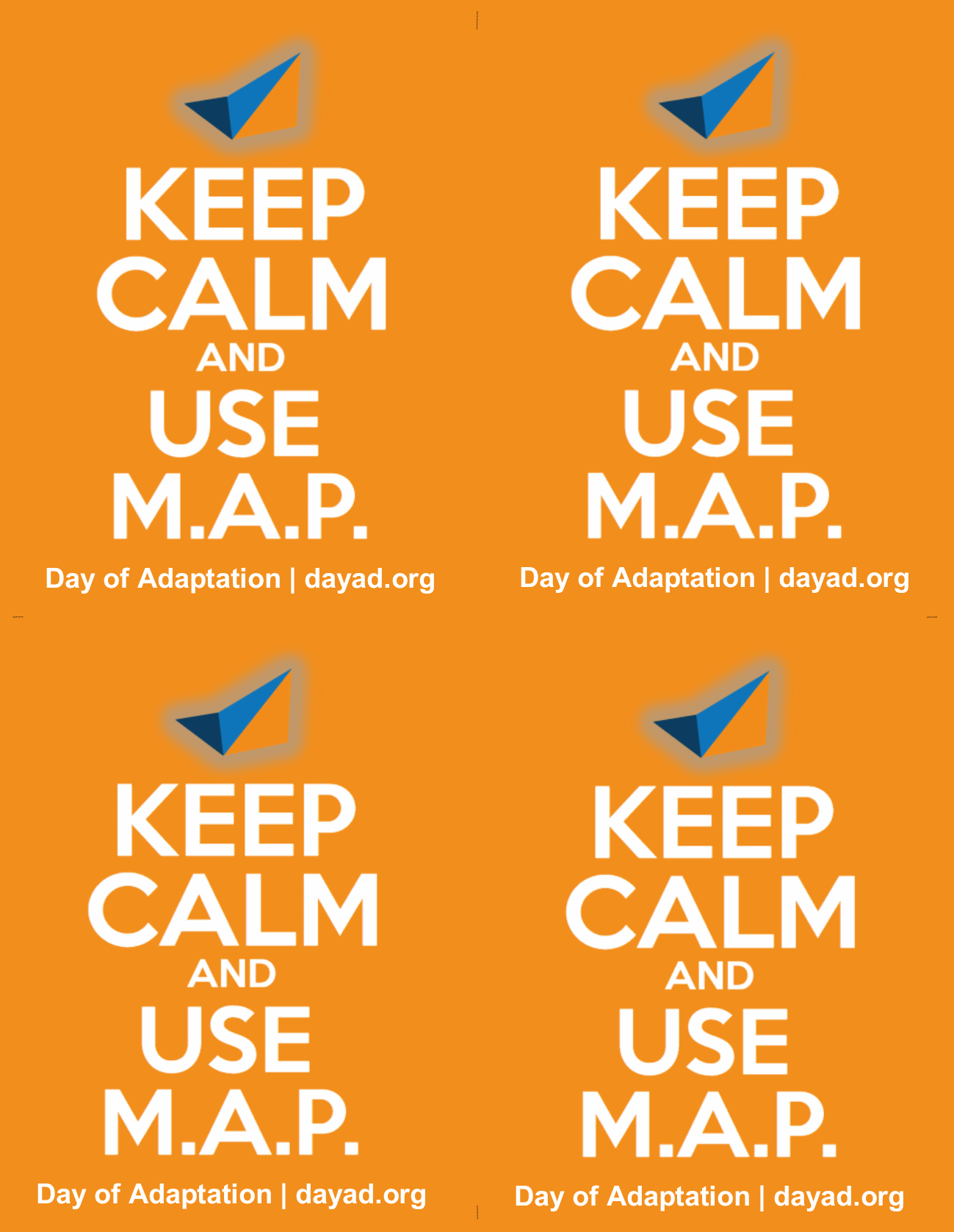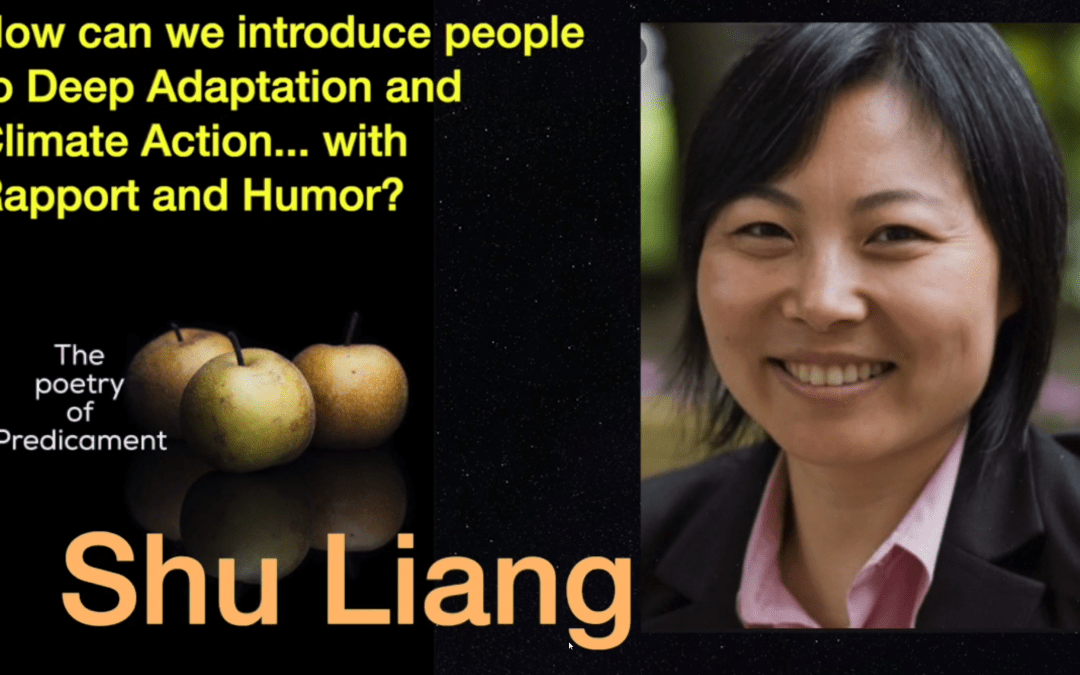In early February 2020 Dean Walker from Living Resilience kindly invited Day of Adaptation’s Shu Liang for an illuminating and, at times, intimate talk in The Poetry of Predicament podcast. This article shares some of the insights from the podcast including:
- the origins and challenges of her journey to become a climate communicator;
- the effects of providing a platform to help people and organisations transition and creating a wider climate conversation through fun and engaging activities, and;
- the candid and hopeful message about sharing vulnerability in very trying times.
The Beginning of a Journey
Climate action requires mammoth undertakings, which often seem to take place at elevated levels and in distant places. This all changed for Shu when she came back from work one day in September ’18. She got the news that the house of a friend was flooded by an unexpected heavy rainfall. Climate change in the face.
Shu was also inspired by Prof. Jem Bendell’s Deep Adaptation paper in the end of 2018. The widely popular and controversial paper offers a conceptual roadmap for how to cope with the economic, political and environmental shocks of climate change. Shu saw opportunities in transforming how we communicate with and engage each other, and embraced the 4R framework in the paper, namely Resilience, Restoration, Relinquishment and Reconciliation.
Shu became more hopeful when she recognized the importance of engaging local communities and organisations. And it’s exactly on that note of hope that this conversation developed itself as Shu presented how Day of Adaptation was born, a reflection on its year zero, and the outputs of its mission to introduce people and organisations to understand, accept, and commit to climate action but in a fun, engaging and inclusive way.
Day of Adaptation’s unique approach stems from its starting point: meeting people and organisations where they are. We use a levelling and inclusive form of communication that broadens the conversation about climate action. But the most distinguishing feature is the use of fun and positivity as vehicles to reach not only people who recognise the need to discuss the topic, but also people who might not yet be convinced of the need to take immediate action.
The dialogues at Day of Adaptation are carried out through a simple framework: Keep Calm and Mind the MAP, with MAP standing for three phrases: Mind the Change, Accept the Transition, and Prepare to Adapt. Using the MAP framework, participants enjoy playing with the topic together. People come from a wide range of backgrounds, connect with each other and stimulate collective climate action.

The Big Challenge
Given that there is already more than 40 years of climate discussion, how do we deal with hope today? And how do initiatives from Day of Adaptation fit into the landscape? According to Shu, it’s a matter of including everyone in the conversation. This entails cultivating the understanding that the challenges exist, allowing people to connect the dots for themselves in a safe space. Through the shared experience, participants can relate to each other, have meaningful discussion and respond in their own capacity. It has been relatively easier here in The Netherlands where it is comfortable to discuss risk due to the country’s historic relationship with water. The awareness of the growing effects of climate change such as rising sea level makes climate action, particularly water management, a very critical everyday task.
But there’s another aspect to this type of conversation. When the noise is too loud, there are moments of heaviness and so-called climate anxiety, with the acknowledgement that a transition is happening but the challenge resides in the pace that needs to be picked up and accelerated. “I try to self-regulate to find light in the darkness: somewhere in between, there lies hope.” Particularly encouraging is the increase in parties taking action. Although facing unknown obstacles, we get to see more and more people and organisations getting involved through meaningful participation, which is a reflection of the Day of Adaptation’s activities. Reaching out beyond the traditional realms of climate action, and shifting the mindset to local action – right then and there in the sessions – is incredibly rewarding. It can then happen where participants live – the household, the neighbourhood, as people prepare for extreme weather conditions, disruptions, etc-, and where they work – like using a carbon footprint tool or thinking of recycling and energy consumption-. How people think about their own actions and the local and global effects of their actions matters. Day of Adaptation’s activities facilitate that conversation, creates rapport among participants and empowers them to take action.
A Shared Reward
There were many lessons during this first year: from concerned skepticism to lighter hearts, from Minions of Disruptions™ to climate superheroes, but it ultimately comes down to finding a platform, a channel to discuss with other people and organisations who share the concern. There is strength in recognizing and sharing our vulnerability, and discussing our concerns with others. In the words of Neil Gaiman: “empathy is a tool for building people into groups, for allowing us to function as more than self-obsessed individuals”. Establishing a sense of connection about our shared concerns both lightens the emotional load and proactively creates the future we want to live in. “It might be confusing, it might be challenging, but it’s very rewarding and it provides that clarity that we all want to have”, as Shu concluded in the podcast.
As we write this, the world takes shelter and slows down in a necessary effort to keep us safe and bring us closer – while maintaining 1.5 meter distance. This situation shows us that we have the camaraderie to work together, to take care of each other, to shift priorities or, more simply, to take a moment to focus on what motivates us all: hope. We hope that all of us, as neighbors, as citizens, as beings on this big roundish rock circling the sun, as a collective force, will overcome our shared predicaments and continue to show up even after the dire moments.
Stichting Day of Adaptation is grateful to The Poetry of Predicament by Dean Walker from Living Resilience for the podcast opportunity. You are welcome to watch/listen to the podcast How to introduce people to Climate Action, Deep Adaptation and Collapse using Rapport and Humor with the link below.
– Article written by Nuno Cabecinha

